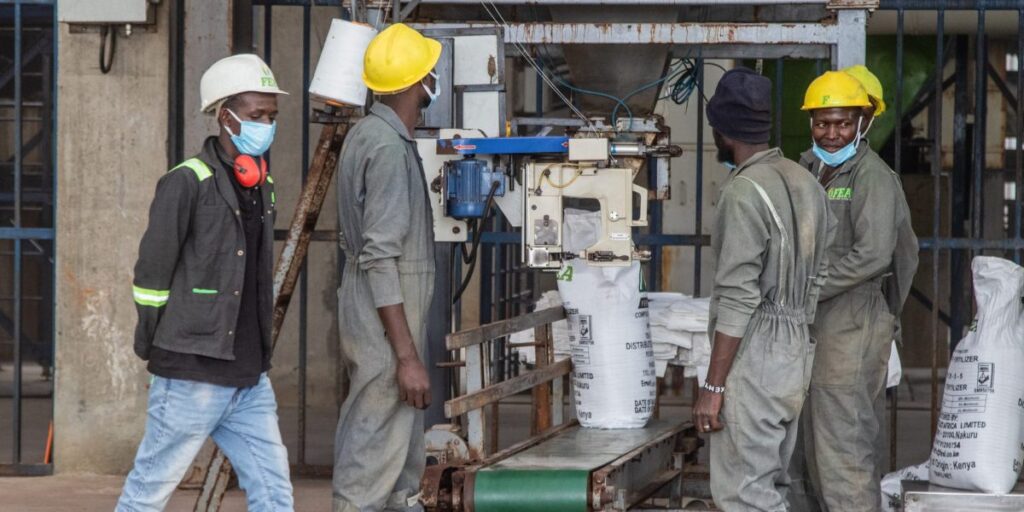
When Benson Wanjala started farming in his village in western Kenya twenty-five years ago, his 10-acre farm could harvest 200 bags of maize. This number has been reduced to 30.
Like many other farmers, he blames acidified fertilizers introduced in Kenya and other African countries in recent years. He said he started using chemical fertilizers to increase yields, and the results were noticeable—until they didn’t. The Kenyan government first introduced fertilizer subsidies in 2008 to make fertilizers more accessible to small-scale farmers.
About 63% of Kenya’s arable land is now acidic, according to the Ministry of Agriculture, which has recorded declines in production of staple foods such as corn, as well as in key horticulture and tea exports. According to the Food and Agriculture Organization of the United Nations, corn production fell 4% to 44 million tons in 2022, but did not explain why.
The Agriculture Department did not respond to questions, especially after the fake fertilizer scandal in April. The fertilizer was found to be quarry soil, packed in misleadingly labeled bags and distributed to farmers through a state subsidy program. President William Ruto says about 7,000 farmers bought fake fertilizers and will be compensated for the correct product.
Soil health problems are growing as the continent struggles to feed itself. According to the African Development Bank, Africa has 65% of the world’s remaining uncultivated arable land, but spends about $60 billion a year importing food. Spending is expected to jump to $110 billion by 2025 due to increased demand and changing spending habits.
In May, Kenya hosted an Africa-wide summit on soil health to discuss declining yields, climate change and other issues that are exacerbating food security concerns. Agriculture is an important part of Kenya’s economy, accounting for more than a quarter of gross domestic product.
At the summit, East African Farmers Federation executive director Stephen Muchiri advocated a return to traditional farming practices to replenish stagnant soil, including growing a variety of crops and damaging the land as little as possible.
“Inorganic fertilizers have never been the basis of crop production,” he said, later adding that due to “commercial agriculture, our soils are now poor, acidic, low in biomass resources, and lifeless!”
He said farmers should rotate crops on their land and get compost material from livestock such as goats: “Our soils have to undergo some kind of transformation and adaptation in order to regain their fertility.”
Experts say acidic soil reduces the supply of plants and essential nutrients, leading to land degradation and making soil more susceptible to structural decay and erosion.
Bridget Mugombe, program coordinator of the African Food Sovereignty Alliance, recommends phasing out chemical fertilizers.
“Soil health is not just a quick fix provided by chemical fertilizers. In fact, chemical fertilizers have severely damaged Africa’s soils. We need to think about our soils in a more holistic way,” she said.
The African Union Soil Health Summit recommended in 2006 that member states use more fertilizers, adopting a ten-year plan that called for increased investment in locally produced organic fertilizers and fertilizers and tripling their use to boost yields.
During the summit, AU Agriculture Commissioner Josefa Leonel Correia Sacko asserted that the continent “loses more than $4 billion worth of soil nutrients every year.”
Kenya relies heavily on imported fertilizers due to low local production. The main supplier is the European Union, followed by Saudi Arabia and Russia.
Kenya’s latest fertilizer scandal should not discourage farmers, said John Macharia, Kenya manager of the Alliance for a Green Revolution in Africa.
“We still have to be able to work with the government to actually make sure that our stores are receiving the right fertilizer,” Macharia said. He recommends chemical and organic methods as long as they solve specific problems in the soil and says soil analysis will provide guidance to farmers.
Declining soil quality is a food security issue across Africa.
Zimbabwe was once a regional breadbasket, but now about 70% of its soil is acidic, according to the government. The government has introduced chemical fertilizers in the past in an attempt to strengthen the soil, but incorrect use has led to a decline in organic matter.
“Before the introduction of mineral fertilizers, our ancestors knew that if organic fertilizers were added, the soil would become fertile and crops would grow better,” said Wonder Ngezimana, associate professor of crop sciences at the Marondera University of Agricultural Sciences in Zimbabwe. Technology. “This is a traditional norm in Zimbabwe and elsewhere in Africa, where people look for anything organic to add to the soil.”
These include animal manure, grass, leaves and twigs, crop residues, ash and compost. But with many farmers in Zimbabwe no longer raising cattle due to the recent drought, Ngezimana said: “Farmers are struggling to maintain soil health because they are unable to produce sufficient amounts of organic matter.”
AGRA advises farmers to test soil acidity and apply lime to reverse high acidity.
But farmers say both methods have limited effectiveness and are costly. Government agricultural agencies, public universities, and private organizations offer soil testing services, with prices ranging from $20 to $40.
Farmer Wanjala said he couldn’t even find money cattle to buy dung and could hardly find seeds.
“I can’t afford any more,” he said.

